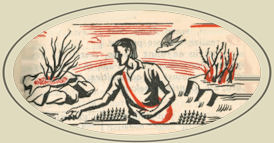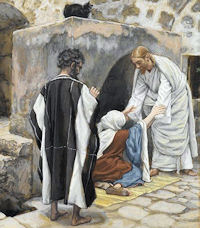» Enjoy our Liturgical Seasons series of e-books!
Sunday Readings
The second reading is from the First Letter of St. Paul to the Corinthians. In this section of his letter St. Paul is encouraging his Corinthian converts to be always ready to forgo their own rights when the edification or spiritual welfare of a neighbor is at stake.
The Gospel is from St. Mark 1:29-39. Surely the people of Capernaum saw enough that first day of Christ's public ministry among them to make them realize that this man from Nazareth who had come amongst them was no ordinary preacher, no ordinary rabbi, no ordinary man. They saw that he preached as one having authority; they saw that by a simple command he cast out demons and removed all bodily ailments. Yet though they were astonished and amazed at his power, their worldly outlook did not let them rise above their own small interests. Our Lord did not blame them or criticize them, he knew and fully understood their slowness of mind in regard to things spiritual, and he knew also that they would eventually give themselves wholeheartedly to his kingdom. While he was prepared to wait for the desired effects which his miracles and preaching would eventually have on them, he hastened the arrival of that day by praying to his heavenly Father to send the graces necessary for their conversion into their hearts.
When the four Apostles found him praying in a lonely place, they told him that all Capernaum was searching for him, but he knew why they were searching for him. They wanted to see more miracles and very likely they were hoping that he would stay on in Capernaum and the sick and the maimed from the whole of Galilee would be brought there for healing. This would increase their earthly business and prosperity. His answer to the Apostles, while not directly condemning this worldly outlook, shows that his mission had an entirely different objective. He had come on earth not to bring earthly prosperity to any town or country but to bring spiritual salvation and blessing on all people. That very morning he began to carry out his mission and for the remaining two years or more he went from town to town preaching the kingdom of God.
We Christians of today have many advantages over the people of Capernaum of that day. They saw Christ with their bodily eyes as a man of power amongst them; we see him with the eyes of faith as he really was and is — the Son of God who came on earth as man in order to make us sons of God. We know who he really was and we know the full meaning of his mission. We have seen that mission completed amongst us by his death on the cross and his resurrection. By his death he conquered death for us; by his resurrection he opened the gates of heaven for us and led the way there for all who will follow him.
This is the good news Christ brought to our world. This is the meaning of Christianity; this is why we are Christians. We are members of Christ's kingdom on earth, so that when our life here ends we shall be members of his everlasting heavenly kingdom. Yet, with all of this knowledge and with the example of the thousands and millions of saints who have lived according to this knowledge over the past nineteen hundred years and more, and who are now enjoying the reward Christianity promised them, how active and how effective is our Christian faith in our daily thoughts and deeds? In my daily dealings with my fellowmen would I be picked out as a Christian? Do I, by my words and deeds, prove to those with whom I live and work that I am convinced there is a future life after death, that reaching that life is the most important thing in this world for me, and that it is through living my short earthly life as a true Christian that I can earn that eternal life?
If I can say yes to these questions I am, thank God, on the right road. But if my answer is "no" then it is time I had another good look to see where I went off the road, and to find out that I can return to that right road once more. God is merciful; Christ is patient with followers who straggle and wander, but it could be fatal to postpone for too long our call to the God of mercy. It will be too late if we delay turning to our patient Christ until we are about to die. Stop straggling and wandering off the highway today and the patient Christ will welcome you and help you back. There may be no tomorrow for you, you have no guarantee of it.
Commentary for the Readings in the 1962 Roman Missal: Every springtime God, as it were, rewrites the Book of Genesis and Creation. Appropriate to the coming spring, Jesus is now pictured as the Divine "Sower." He sows "seed" in the soil of our souls, covered with "rocks" of hardening pride, "thorns" of softening "pleasures!"
The Epistle is a vivid picture, moving in quick action over Europe and Asia, but above all moving our souls to action as it describes the sacrifices of Paul, the "sower," sowing the "word of God," despite passions from within, persecutions from without.
The first reading is taken from the Book of Job 7:1-4, 6-7. The author cries out in his misery, speaks of life and death, cites his restlessness and life's struggle and notes that he will not see happiness again.
—Excerpted from The Sunday Readings by Fr. Kevin O'Sullivan, O.F.M.
Sexagesima Sunday
 "The sower went out to sow his seed . . . Now . . . the seed is the word of God" (Gospel).
"The sower went out to sow his seed . . . Now . . . the seed is the word of God" (Gospel).
—Excerpted from My Sunday Missal, Confraternity of the Precious Blood








